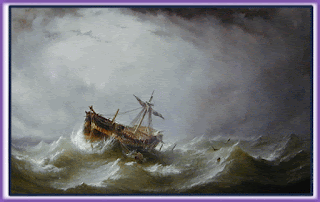1. Did you ever go far out upon the great ocean? How beautiful it is to be out at sea, when the sea is smooth and still!
2. Let a storm approach, and the scene is changed. The heavy, black clouds appear in the distance, and throw a deep, deathlike shade over the world of waters.
3. The captain and sailors soon see in the clouds the signs of evil. All hands are then set to work to take in sail.
4. The hoarse notes of the captain, speaking through his trumpet, are echoed from lip to lip among the rigging. Happy will it be, if all is made snug before the gale strikes the vessel.
5. At last, the gale comes like a vast moving mountain of air. It strikes the ship. The vessel heaves and groans under the dreadful weight, and struggles to escape through the foaming waters.
6. If she is far out at sea, she will be likely to ride out the storm in safety. But if the wind is driving her upon the shore, the poor sailors will hardly escape being dashed upon the rocks, and drowned.
7. Once there was a ship in a storm. Some of her masts were already broken, and her sails lost. While the wind was raging, and the billows were dashing against her, the cry was heard, "A man has fallen overboard!"
8. Quickly was the boat lowered, and she was soon seen bounding on her way over the mountain waves. At one moment, the boat seemed lifted to the skies, and the next, it sank down, and appeared to be lost beneath the waves!
9. At length, the man was found. He was well nigh drowned; but he was taken on board, and now they made for the ship. But the ship rolled so dreadfully, that it seemed certain death to go near her. And now, what should they do?
10. The captain told one of the men to go aloft and throw down a rope. This was made fast to the boat, and when the sea was somewhat calm it was hoisted, and all fell down into the ship with a dreadful crash. It was a desperate way of getting on board; but fortunately no lives were lost.
11. On the dangerous points along our seacoast are lighthouses, which can be seen far out at sea, and serve as guides to ships. Sometimes the fog is so dense that these lights can not be seen, but most lighthouses have great fog bells or fog horns; some of the latter are made to sound by steam, and can be heard for a long distance. These bells and horns are kept sounding as long as the fog lasts.
12. There are also many life-saving stations along the coast where trained men are ready with lifeboats. "When a ship is driven ashore they at once go to the rescue of those on board, and thus many valuable lives are saved.
13. Take it all in all, a sailor's life is a very hard one. Our young friends owe a debt of gratitude to those whose home is upon the great waters, and who bring them the luxuries of other countries.
DEFINITIONS.—4. Ech'oed, sounded again. Gale, a wind storm. 5. Heaves, pitches up and down. 7. Bil'lows, waves. 10. Des'-per-ate, hopeless. 11. Fog, watery vapor, mist. 13. Grat'i-tude, thankfulness. Lux'u-ries, nice things.
EXERCISES.—What is this lesson about? When is it dangerous to be at sea? What do sailors then do? In what situation are they most likely to be saved? Relate the story of the man overboard. Tell about the lighthouses. How are vessels warned of danger in a fog? What about the life-saving stations? What is said of a sailor's life?























No comments:
Post a Comment
Note: Only a member of this blog may post a comment.